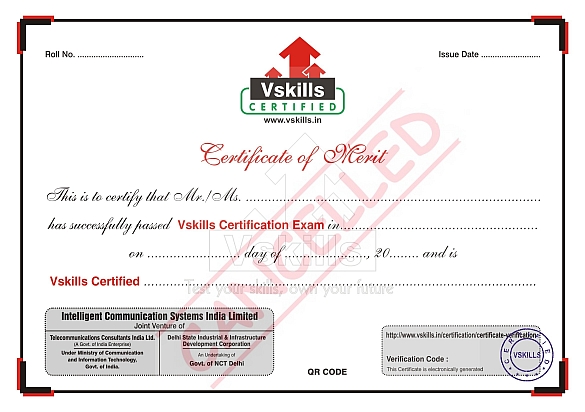- Duration / Course length: 1 To 2 Months Start now
- Certificates:
- Course delivery: This course is delivered in video format
Course details
Why should I take Cost Accountancy certification?Cost Accountancy is an important subject for anyone who aspires to make a career in finance and entrepreneurship. This certification will teach candidates how to find the factors affecting the profits in a business. You will be able to understand the importance of Cost Control & Cost reduction to improve the profits. The certification will test the candidates on various areas in cost concepts and classification, materials, labour costs, overheads analysis, job order costing, single costing, marginal costing and cost-volume-profit analysis.
How will I benefit from Cost Accountancy certification?
Cost Accountancy professionals are in great demand. Companies specializing in finance or manufacturing are constantly hiring skilled cost accountants. Various public and private companies also need cost accountant for their finance, costing & taxation departments.
Table of Contents
Introduction to Cost and Management Accounting
- Concepts of Cost
- Costing, Cost Accounting and Cost Accountancy
- Objectives of Cost Accounting
- Importance of Cost Accounting
- Scope of Cost Accounting
- Classification of Costs
- Cost Centre and Cost Unit
- Methods of Costing
- Techniques of Costing
- Installation of a Costing System
- Difference between Financial Accounting and Cost Accounting
- Difference between Financial Accounting and Management Accounting
- Inventory Control (Material Control)
- Objectives of Inventory Control
- Techniques of Inventory Control
- Store-Keeping
- Functions of Store-Keeping
- Method of Pricing of Material Issues
- Accounting of Material Losses
- Control of Material Losses
- Inventory Management
- Introduction to Labour Cost
- Classification of Labour Cost
- Accounting and Control of Labour Cost
- Time Recording
- Time-Keeping
- Time Keeping
- Overtime
- Idle Time
- Labour Turnover
- Labour Remuneration System
- Basic Methods of Remuneration System
- Incentive schemes
- Direct expenses
- Indirect expenses
- Overheads
- Collection of Overheads
- Classification of Overheads
- Allocation and apportionment of overheads (depart-metallization of overheads)
- Allocation of Overheads
- Apportionment of Overheads
- Absorption of overheads
- Methods of Absorbing Production Overheads
- Over or Under Absorption Of Overheads
- Treatment of Factory Overheads
- Treatment of Administrative Overheads
- Treatment of Selling And Distribution Overheads
- Control of Overheads
- Preparation of Cost Sheet
- Introduction
- Meaning of Activity Based Costing
- Basics of Activity Based Costing
- Distinction Between Traditional Absorption Costing and Activity Based Costing
- Objectives of Activity Based Costing
- Terminology of Activity Based Costing
- Stages in Developing Activity Based Costing System
- Different Types of Activities
- Introduction
- Non-Integrated Accounting System
- Advantages of Non-Integrated Accounting
- Limitations of Non-Integrated Accounting
- Integrated (Integral) Accounting System
- Need For Reconciliation
- Causes of Differences
- Preparation of Reconciliation Statement or Memorandum Reconciliation Account
- Introduction
- Single/Output/Unit Costing
- Cost Sheet
- Job Costing
- Batch Costing
- Contract Costing
- Process Costing
- Service Costing
- Features of Marginal Costing
- Advantages of Marginal Costing
- Limitations of Marginal Costing
- Break-Even Analysis/Cost-Volume Profit Analysis
- Uses of Cost-Volume-Profit Analysis
- Contribution
- Marginal Cost Equation
- Profit-Volume Ratio
- Margin of Safety
- Methods For Determining Break Even Points
- Applications of Marginal Costing
- Composite Break Even Point
- Absorption Costing
- System of Profit Reporting
- Introduction
- Definition and Meaning
- Applications of Standard Costing
- Various Types of Standards
- Standard Costing System
- Variance Analysis
- Material Cost Variances
- Material Usage Variance
- Material Mix Variance
- Materials Yield Variance
- Overhead Cost Variances
- Variable Overhead Variance
- Fixed Overhead Variance
- Budget
- Budgeting
- Budgetary Control
- Forecast and Budget
- Zero Base Budgeting
- Cost Audit
- Purpose of Cost Audit
- Advantages of Cost Audit
- Appointment of Cost Auditor
- Rights and Responsibilities of Cost Auditor
- Implementing Authorities of Cost Audit
- Cost Audit Techniques
- Cost Audit Programme
- Cost Audit Report
- Financial Statements
- Importance of Financial Statements
- Analysis of Financial Statements
- Types of Financial Statement Analysis
- Methods of Analyzing Financial Statements
- Ratio Analysis
- Uses of Ratio Analysis
- Classification of Ratios
Job roles this course is suitable for:
Cost Accounant , Cost Control Analyst , Cost Accounting ManagerAbout Vskills
Vskills is the largest certification body of India. We conducts skills testing and certification exam to improve employability. The certifications are quite popular and top companies hire Vskills certified professionals.
Companies have benefitted by hiring pre-certified candidates from Vskills and also use the certifications for their in house employee appraisals. Certification helps in distinguishing individuals to demonstrate their domain knowledge or skills needed for a specific profile. So a professional certification offers tangible benefits to both the individual and the employer.
Tests are conducted in a secure and unbiased manner, and certificates are awarded based on merit of the candidates who qualify tests.
Vskills certifications are for relevant qualifications that help students/employees quantify and prove those skills that are valued by the employer and are in great demand.





